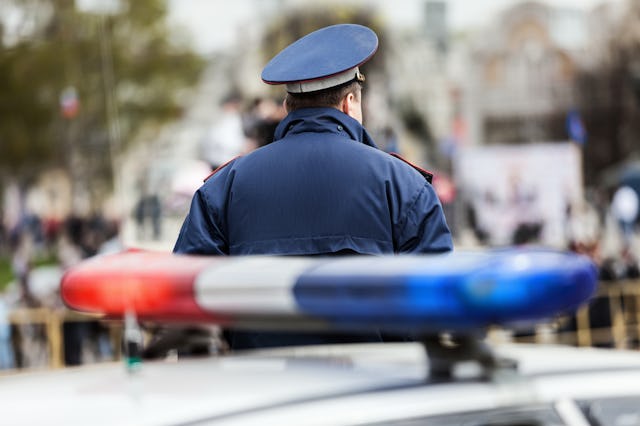Hillary Clinton And Donald Trump On Crime

No one would deny that police reform is a major issue in America today. The Black Lives Matter Movement has made that obvious. But people differ over the problem of crime itself. The Brennan Center reports that “according to a Gallup poll, from November 2014, despite dramatic declines in the nation’s violent crime rate, a majority of Americans say ‘there is more crime in the U.S. than there was a year ago.'” However, “government statistics show that, except for some small blips, serious crime has decreased almost every year from 1994 through 2013.” And as Hillary Clinton said in the last debate, murders have fallen in New York City, “where homicides are at an all-time low.”
Hillary Clinton believes that “everyone in America should respect the law and be respected by the law. We need to end mass incarceration, use strategies like police body cameras to improve accountability, increase substance abuse treatment, and aim resources at criminals who pose the greatest threat. And we need to invest in education and job training — the foundations of success.” Basically, Clinton wants law and order while the public’s rights are respected. She wants to work to mitigate crime through social programs, and make police accountable. The law, in other words, works for the people.
The first item on her list of reforming crime and punishment in the United States emphasizes police reform. She’d do this by “bringing law enforcement and communities together to develop national guidelines on the use of force by police officers, making it clear when deadly force is warranted and when it isn’t and emphasizing proven methods for de-escalating situations.” As she told an African-American congregation, “There is too little trust in many places between the police and the people they are sworn to protect.” However, she said in July, “We cannot, we must not, vilify police officers.”
That trust is fragile — and much less in some areas. We need, Hillary says, to admit that “implicit bias exists across society,” i.e., as sung in Avenue Q, “Everyone’s a little bit racist sometimes / Doesn’t mean we go around committing hate crimes.” This bias exists even “in the best police departments” and “we need to tackle it together.” We need to end racial profiling, provide better training on de-escalation and implicit bias, and support municipalities that refer the investigation and prosecution of police-involved death to independent bodies.” Hillary will “commit $1 billion in her first budget to find and fund the best training programs, support new research, and make this a national policing priority.”
Hillary will also make “new investments to support state-of-the-art law enforcement training programs at every level on issues like use of force, de-escalation, community policing and problem solving, alternatives to incarceration, crisis intervention, and officer safety and wellness.” In South Carolina, Hillary said, “We have to figure out how we’re going to life up the good practices, reform policing, and provide more support.”
Hillary will strengthen the Department of Justice’s unit that monitors civil rights violations with more money, “working to secure subpoena power, and improving data collection.” That Department’s “Collaborative Reform” program, which works with police departments across the country finding creative or innovative methods, would see its funding doubled.
Moreover, Hillary says we also need to provide oversight and accountability to the use of what she calls “controlled equipment”: military equipment transferred from the federal government to the local level. This includes tanks, one of which is owned by the city of Columbia, South Carolina. She wants to bolster “smart policing” at the local level, rather than “buy weapons of war that have no place on our streets.”
She also has plans to help people transition from prison into society. This includes banning federal employers and contractors from asking about an interviewee’s criminal record before they demonstrate their qualifications, “investing $5 billion in re-entry job programs for formerly incarcerated individuals,” and pushing for an end to banning those who have served their sentences from voting.
Hillary also wants to end mandatory minimum sentences “that keep nonviolent drug offenders in prison longer than they need to be. Hillary will give judges more discretion over sentencing, cut the mandatory minimum sentences for nonviolent drug offenders in half, and eliminate the disparity between sentences for crack and powder cocaine possession.”
On the other hand, Trump emphasizes law and order: “Crime and violence is an attack on everyone — particularly the poor — and is unacceptable. We will have strong, swift fair law and order. […] We must work with law enforcement and first responders to keep our communities safe.” He believes the people have to serve the law, rather than, as Hillary thinks, the law has to serve the people.
Trump thinks crime is up, as he said in the first Presidential debate. “Crime is harming too many citizens. Racial tensions have gotten worse, not better. This isn’t the American Dream we want for our children.” That violent crime, he said, citing Bill O’Reilly, “committed in our major cities is committed by blacks and Hispanics.” Muslims, he said, “have to cooperate with law enforcement and turn in the people they know are bad.” Moreover, “when Mexico sends in its people, they’re bringing drugs, they’re bringing crime. They’re rapists.”
When it comes to police officers, Trump says, “We have to maintain law and order at the highest level or we will cease to have a country.” However, “you’re going to have abuse and you’re going to have problems, and you’re got to solve those problems and you have to weed out the problems.” The police “and law enforcement personnel are what separates civilization from total chaos — and the destruction of our country as we know it.” He also thinks the police are “absolutely mistreated and misunderstood.”
Trump does not have any specific plans for police or criminal justice reforms.
This article was originally published on